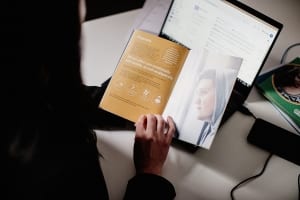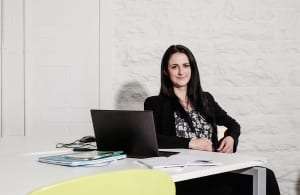“I think Ireland is a great place to be a female entrepreneur. There are so many networking opportunities and great support. It’s just a case of finding it and using it.”
Suzanne Moloney, Founder and CEO, Hidramed Solutions
Key Takeouts:
Case Study: Hidramed
Finding a solution to a problem leads to the development of innovative and vital products – or to put it another way, necessity is the mother of invention. One Irish entrepreneur who embodies this phrase is Suzanne Moloney, whose very real need for a solution to managing her medical issue led to the development of a new and innovative wound management system, HidraWear.
HidraWear is the first product from Hidramed Solutions, and was developed with the support of Enterprise Ireland’s Competitive Start Fund (CSF). Suzanne herself was the recipient of a grant from a round of the CSF for Women Entrepreneurs, and believes that it is this type of support that helps the growth of women in the business world. “I think Ireland is a great place to be a female entrepreneur – there are so many networking opportunities, great support – it’s just a case of finding it and using it.”
Hidramed Solutions was inspired by patient frustrations
Suzanne was inspired to start Hidramed Solutions and develop HidraWear when she found that her own frustration at managing her medical condition was shared by other patients. “I have a condition called HS, or hidradenitis suppurativa. It’s a debilitating disease of the skin that affects at least 1% of the population globally, and it’s incurable. It causes lesions in the skin in places like the armpit and the groin, quite sensitive areas, which would need to be covered with a bandage. I was a chef and a baker and quite physically active in my work, and to keep a dressing on my thigh or armpit would be virtually impossible – they’d just fall off due to the moisture in the area and the fact that these areas are not flat surfaces and need to move in multiple directions. I’ve come across other HS patients improvising with sanitary towels and kitchen paper – there was literally no solution there for HS patients.
 “I found myself spending far too much time on trying to manage these dressings. The straw that really broke the camel’s back was when I attended a friend’s hen party and was talking to the groom’s mother. I was shaking her hand and a dressing just fell out of my dress. I always had this idea to develop some sort of solution and that just spurred me on to really find something that worked for HS patients.”
“I found myself spending far too much time on trying to manage these dressings. The straw that really broke the camel’s back was when I attended a friend’s hen party and was talking to the groom’s mother. I was shaking her hand and a dressing just fell out of my dress. I always had this idea to develop some sort of solution and that just spurred me on to really find something that worked for HS patients.”
After initial work with a product designer that didn’t progress, Suzanne decided to try again, this time with the help of Enterprise Ireland. “I applied for a co-funded Innovation Voucher to develop a prototype with design experts at NCAD.”
The result was HidraWear. “The product removes the need for using adhesive on the skin, which can damage the skin around the lesion if you’re constantly putting bandages on the area, causing medical adhesive-related skin injuries (MARSI). We’re also giving back control to HS patients by making changing a dressing quick, painless and easy. It’s very discreet and convenient too.”
“It’s a Class one medical device, so the regulatory burden is quite low, which means we can roll it out to other countries relatively quickly.” says Moloney.
The product is scheduled for launch towards the end of 2019, initially in the UK and Irish markets, but the plan is to roll it out quickly into the US and throughout Europe. We are beginning with an armpit solution and then moving onto products for other areas of the body quite quickly. But we also plan to be a support system for HS patients – we want to help, not just be a dressing company.”
Getting support from prototype to launch
Going from prototype to launching a working product is a long journey, but Suzanne did the research and found plenty of support along the way. “We received a grant from the CSF for Women Entrepreneurs in 2018. We also received invaluable advice and guidance along the way. Through the mentoring programme, we were paired with Aileen McGrath, who is a marketing expert and highly skilled in ecommerce – which was really vital, as we are selling directly to the consumer, an unusual approach for a medical product.
“I made some mistakes at the start but once I got the right advice, things began to happen for me very quickly – particularly when I was accepted on the BioExel Medtech Accelerator Programme at NUI Galway, which is backed by Enterprise Ireland. This was a six-month programme that taught me everything I needed to know about developing a medical device and developing a business.”
Once the first product is launched, growing its distribution and developing more products are the next items on Suzanne’s list. The company plans to sell direct to consumer to begin with but is developing reimbursement strategies for the UK and USA, with plans to sell into healthcare channels too.
“We also have a whole series of products planned for the future, for example, adhesive-free bandaging for elderly patients, venous leg ulcers and pressure sores. Our market entry point, however, is through HS.”
Under the Competitive Start Fund, up to €50,000 in equity funding is available to successful applicants with early stage start-up companies.



